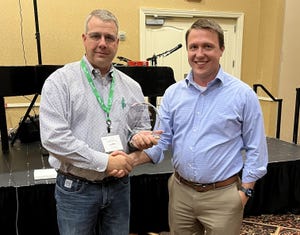Residents, businesses and the hog industry of the southeastern United States continue to survey the damage caused by Hurricane Matthew.
October 14, 2016

Eyes of the nation have been fixated on the southeastern United States in the aftermath of the Hurricane Matthew that inundated that area with up to 18 inches of rainfall, along with the damage from high winds.
The latest count has 43 human deaths in the United States due to Hurricane Matthew, making the loss of homes and businesses trivial.
Southeastern U.S. agriculture has also been impacted, and the North Carolina Pork Council issued a statement by CEO Deborah Johnson on Oct. 13 saying “Hog farms across eastern North Carolina are continuing to assess the damage caused by Hurricane Matthew and the extensive flooding brought by the storm. There are more than 2,100 permitted hog farms in North Carolina and the vast majority of them faced tremendous challenges caused by the storm. Fortunately, the damage caused by the storm up to this point has been relatively minimal.
“There remains a serious threat to life and animals caused by additional flooding, and the pork industry continues to work tirelessly to protect hog farms, animals and the environment.”
In her statement, Johnson squelched previous reports by environmental groups exaggerating the impact the storm had on manure storage lagoons across the state. Johnson indicates that 11 hog farms in eastern North Carolina have been inundated with flood waters, and in her statement explains the difference between a lagoon breach and one that is inundated. A breach is a failed lagoon, as where one that is inundated remains intact. “The floodwater runs over the lagoon and carries away only a small portion of wastewater that is heavily diluted. Most of the wastewater remains in the lagoon and the environmental impact is greatly minimized.”
Smithfield Foods, headquartered in Virginia, has hog farms and processing facilities in North Carolina and Virginia, and issued a statement saying “employees are working around the clock to determine the impact” the storm had on farms and processing facilities.
In the statement, Smithfield reports that none of the plants in North Carolina or Virginia suffered substantial damage, but the flooding was making hog and employee movement difficult. Virginia facilities were operating at full capacity, while the North Carolina processing facilities were operating at a reduced rate. Smithfield anticipates having those facilities back to full production next week.
As of Thursday afternoon, Smithfield reports that none of the company’s farms suffered a breach or lagoon failure, though there was one report of flood waters rising into a lagoon on a contract farm.
“This remains a serious, life-threatening situation, and our top priorities continue to be the safety and well-being of our employees and the care of our animals,” the Smithfield statement concludes.
North Carolina pork producers have lost about 3,000 hogs due to Hurricane Matthew, down from the 21,474 that died as a result of when Hurricane Floyd hit the region in 1999.
The North Carolina Department of Agriculture and Consumer Services has activated its toll-free hotline to help farmers affected by Hurricane Matthew connect with resources that can assist with recovery. Farmers who have an agricultural emergency can call 866-645-9403.
You May Also Like



